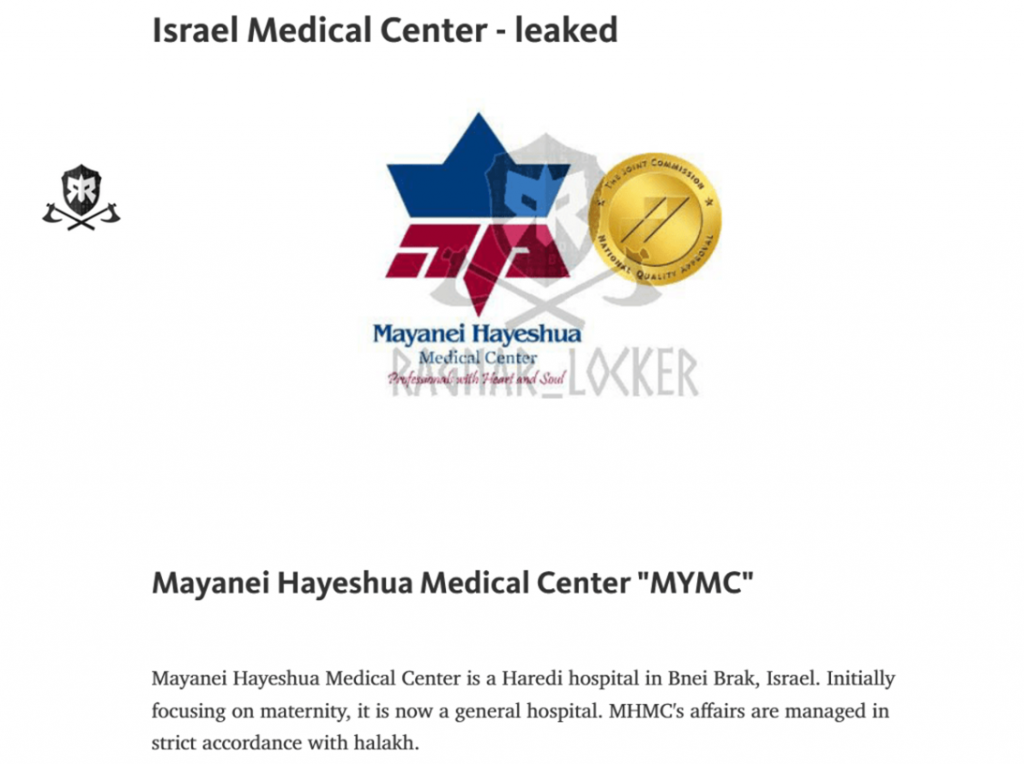Carding
Professional
- Messages
- 2,870
- Reaction score
- 2,494
- Points
- 113
Extortionists emphasized the careless attitude of the institution to the data of its customers.
The hacker group Ragnar Locker has officially claimed responsibility for a cyber attack on Israel's Mayanei Hayeshua hospital last month. The criminal group claims to have stolen 1 TB of data and threatens to publish it soon if it does not receive its cash ransom.
In a message published on their own website for leaks, the hackers clarified that they deliberately did not encrypt the hospital's computers in order not to disrupt the operation of medical equipment. However, they found serious vulnerabilities in the institution's network, which allowed downloading hundreds of gigabytes of information.

Ad on the Ragnar Locker leak site
The theft affected patients personal information, financial data, medical records, and other sensitive information.
"Today we are publishing the first batch of internal MYMC files, including a lot of personal and financial information, medical records and many other confidential data," the hackers said.
"But this is not all, in the next 3-4 days we will put on public display a complete SQL database and a huge bunch of pst files with internal correspondence," the ransomware specified.
The hospital's network was hacked in early August. The attack disabled administrative computer systems, but did not affect the operation of medical equipment.
Hackers claim that they tried to contact the hospital administration, but the specialists of the latter showed disrespect to the members of Ragnar Locker, trying to catch them using phishing. Hackers came to the conclusion that the hospital management does not care about the privacy of their patients, which is why they began to publish the stolen data.
In March 2022, the FBI and CISA alerted the Ragnar Locker group, reporting that hackers had penetrated the networks of at least 52 organizations in 10 key infrastructure sectors, stealing confidential information and encrypting data. The FBI alert also included details about attack methods, bitcoin addresses for receiving ransoms, and email addresses of the group's operators.
This ransomware incident highlights the need to increase the level of cybersecurity in medical institutions and makes it clear that hackers are clearly not to be trifled with, so as not to harm their own reputation.
The hacker group Ragnar Locker has officially claimed responsibility for a cyber attack on Israel's Mayanei Hayeshua hospital last month. The criminal group claims to have stolen 1 TB of data and threatens to publish it soon if it does not receive its cash ransom.
In a message published on their own website for leaks, the hackers clarified that they deliberately did not encrypt the hospital's computers in order not to disrupt the operation of medical equipment. However, they found serious vulnerabilities in the institution's network, which allowed downloading hundreds of gigabytes of information.

Ad on the Ragnar Locker leak site
The theft affected patients personal information, financial data, medical records, and other sensitive information.
"Today we are publishing the first batch of internal MYMC files, including a lot of personal and financial information, medical records and many other confidential data," the hackers said.
"But this is not all, in the next 3-4 days we will put on public display a complete SQL database and a huge bunch of pst files with internal correspondence," the ransomware specified.
The hospital's network was hacked in early August. The attack disabled administrative computer systems, but did not affect the operation of medical equipment.
Hackers claim that they tried to contact the hospital administration, but the specialists of the latter showed disrespect to the members of Ragnar Locker, trying to catch them using phishing. Hackers came to the conclusion that the hospital management does not care about the privacy of their patients, which is why they began to publish the stolen data.
In March 2022, the FBI and CISA alerted the Ragnar Locker group, reporting that hackers had penetrated the networks of at least 52 organizations in 10 key infrastructure sectors, stealing confidential information and encrypting data. The FBI alert also included details about attack methods, bitcoin addresses for receiving ransoms, and email addresses of the group's operators.
This ransomware incident highlights the need to increase the level of cybersecurity in medical institutions and makes it clear that hackers are clearly not to be trifled with, so as not to harm their own reputation.

